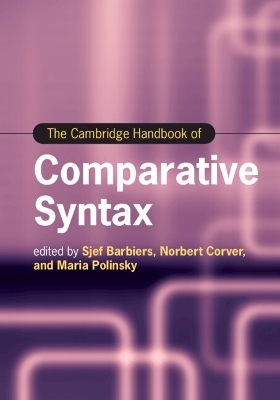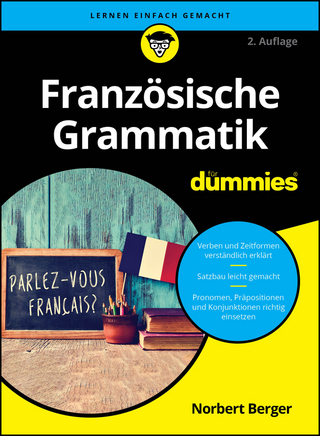
The Cambridge Handbook of Comparative Syntax
Cambridge University Press (Verlag)
9781009179386 (ISBN)
Bringing together a globally representative team of scholars, this Handbook provides a comprehensive overview of comparative syntax, the study of universal and variable properties of the structure of building blocks in natural language. Divided into four thematic parts, it covers the various theoretical and methodological approaches to syntactic variation; explores dependency relations and dependency marking; shows how the building blocks of syntax both vary and display universal properties across languages, and explores the interfaces between syntax and other aspects of language structure. It also includes examples from a typologically broad range of languages, as well as data from child language, sign language, language processing, and diachronic syntax, giving a clear picture of the ubiquity of cross-linguistic variation. It serves as a source of inspiration for future research, and forges a deeper understanding of the variant and invariant parts of language, making it essential reading for researchers and students in linguistics.
Sjef Barbiers is Professor of Dutch Linguistics at Leiden University. He was the leader of the Syntactic Atlas of the Dutch Dialects and European Dialect Syntax projects. He is currently the Scientific Director of the Leiden University Centre for Linguistics. Norbert Corver is Professor of Dutch Linguistics at Utrecht University. He is co-editor of several books, including Semi-lexical Categories (with van Riemsdijk, 2001, De Gruyter Mouton) and Diagnosing Syntax (with Cheng, 2013, OUP) He is currently the scientific director of Utrecht University Institute for Language Sciences. Maria Polinsky is Professor of Linguistics at the University of Maryland and Director of the National Heritage Research Center at UCLA. She has served on the editorial boards of multiple journals and advisory boards of several international centres. She is the author of multiple scholarly articles and several books, and editor of several handbooks.
1. The comparative syntactic enterprise: an introduction Sjef Barbiers, Norbert Corver and Maria Polinsky; Part I. Comparative Syntax: Theory, Methodology and Data Collection: 2. Theoretical approaches to comparative syntax Sjef Barbiers, Guido Vanden Wyngaerd and Jenneke van der Wal; 3. Databases for comparative syntactic research Jessica K. Ivani and Balthasar Bickel; 4. Quantitative approaches to syntactic variation Jeroen van Craenenbroeck and Marjo van Koppen; 5. Computational approaches to syntactic variation Tim Hunter and Robert Frank; 6. Comparative syntax from formal and functional perspectives Polina Pleshak and Maria Polinsky; 7. Micro-comparative syntax, dialectology, and sociolinguistics Sjef Barbiers; 8. Change: Comparative syntax and diachrony Adam Ledgeway; 9. Universal and language-specific properties of language: a view from language acquisition Maria Teresa Guasti and Elena Pagliarini; Part II. Comparative Syntax: Building Blocks and Combinatorial Properties: 10. Words and features Paula Fenger and Maria Kouneli; 11. Pronouns: Structure, binding, and classification Elizabeth Ritter and Martina Wiltschko; 12. Functional architecture of nominal phrases Artemis Alexiadou; 13. Functional architecture of adjectival phrases Norbert Corver; 14. Functional architecture of prepositional phrases Marcel den Dikken and Éva Dékány; 15. Analyzing tenselessness Hamida Demirdache and Hongyuan Sun; 16. Voice Jim Wood and Matthew Tyler; 17. Coordination Jan-Wouter Zwart; 18. Clause types Raffaella Zanuttini, Paul Portner and Miok Pak; Part III. Comparative Syntax: Dependency Relations and Dependency Marking: 19. Agreement and concord Emily Clem and Mark Norris; 20. Head dependencies Ian Roberts; 21. A-dependencies Suzanna Fong and Claire Halpert; 22. Anaphoric dependencies Martin Everaert and Eric Reuland; 23. The comparative syntax of nominal quantifier Peter Jenks; 24. Ā-dependencies and successive cyclic movement Lisa Lai-Shen Cheng; 25. From interrogatives to relatives: a comprehensive account of wh-constructions Radek Simik; Part IV. Comparative Syntax: Interfaces: 26. Syntax semantics Klaus Abels and Veneeta Dayal; 27. Comparative syntax, morphology, and 'externalization' (What happens at PF?) David Embick; 28. Syntax and externalization: Linearization Ad Neeleman; 29. Cross-modal comparative syntax Roland Pfau and Josep Quer; 30. Syntax and information structure Fatima Hamlaoui and Kriszta Szendroi; 31. Syntactic dependency formation in sentence processing: a comparative perspective Brian Dillon and Maayan Keshev.
| Erscheinungsdatum | 05.09.2025 |
|---|---|
| Reihe/Serie | Cambridge Handbooks in Language and Linguistics |
| Zusatzinfo | Worked examples or Exercises |
| Verlagsort | Cambridge |
| Sprache | englisch |
| Maße | 179 x 249 mm |
| Gewicht | 1780 g |
| Themenwelt | Geisteswissenschaften ► Sprach- / Literaturwissenschaft ► Sprachwissenschaft |
| ISBN-13 | 9781009179386 / 9781009179386 |
| Zustand | Neuware |
| Informationen gemäß Produktsicherheitsverordnung (GPSR) | |
| Haben Sie eine Frage zum Produkt? |
aus dem Bereich


